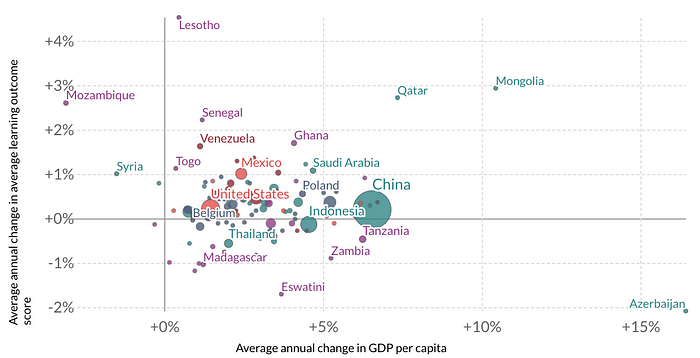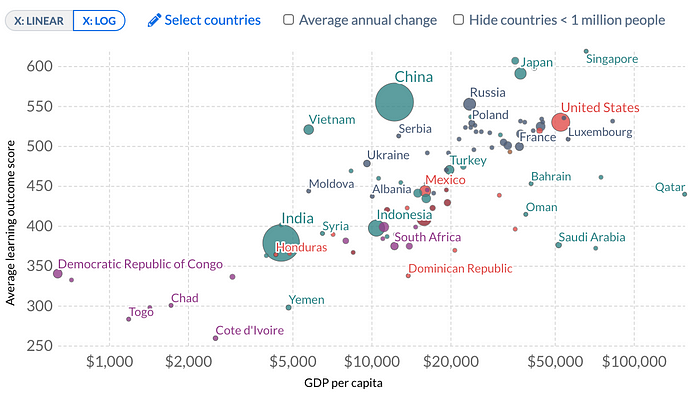

Reasons For Optimism
source link: https://medium.com/alpha-beta-blog/reasons-for-optimism-23f87fb466c
Go to the source link to view the article. You can view the picture content, updated content and better typesetting reading experience. If the link is broken, please click the button below to view the snapshot at that time.
Reasons For Optimism
Innovation and education will help us live better and better lives
I help institutions identify and manage their investment risks as part of my day job. So my brain naturally is more attuned to looking for dangers and threats. But constant pessimism, doom, and gloom can be suffocating. I honestly believe that the greatest strength of humans as a whole is our inherent optimism and ingenuity — these two traits combined are what allow us as a whole to overcome the most extreme of obstacles.
So I wanted to write out some reminders for you all (and for me) about why we should be optimistic, despite the current state of the world.
The average quality of life for people in much of the world has advanced at an unprecedented pace over the past few decades. And it hasn’t stopped now. Progress comes in fits and starts. There’s no such thing as linear progress, and historically it’s often crises such as conflict, famine, etc. which force people to innovate. Other times it’s random chance — smart people working on the right problem at the right time make a breakthrough (like the researchers at Bell Labs inventing the transistor and setting the stage for the semiconductor revolution).
When these positive shocks happen, they put humanity as a whole on a new, higher, and previously impossible-to-imagine trajectory. Given the randomness around innovation, both in terms of its pace and in terms of which fields that look promising right now turn out to be truly transformative, there’s no point to try to predict or extrapolate. Rather, just be comforted by the fact that attempts to innovate are constantly happening. It’s like millions and millions of coin tosses being made every year — the chance of coming up heads on each toss might be incredibly tiny, but the sheer number of tosses all but ensures that eventually some of those bets will pay off.
And that brings me to my second reason for optimism — education levels are going up across the world. I firmly believe that increasing education levels translates to higher GDP per capita, which over time translates into better life quality.

While not perfect, it’s comforting that in the chart above most of the countries are in the top right quadrant meaning that both education levels and GDP per capita have been growing. Looking at the chart below (which shows a current as of 2015 snapshot of education levels vs. GDP per capita as opposed to rate of change), we can see that counties with higher levels of education also have higher wealth per person.

Obviously, correlation doesn’t mean causation — the counter is that richer countries have more time and money to spend on educating their citizens. But I do believe that there’s a positive feedback effect where higher education levels help a country become wealthier which allows them to spend even more on education and so forth.
And as the world becomes increasingly educated, that increases the probability of humanity as a whole uncovering that next transformative spark. When only 10% of the people in the world are highly educated, there’s a huge opportunity cost — it means that a significant number of gems in the rough will never be polished and given their chance to shine. So the more people around the world that have a fair shot at a good education, the more we can realize our collective potential to innovate.
Lastly while I’ve been pretty critical of capitalism and the unfair outcomes that often come with it, it does do a fairly good job of allocating capital to where it’s needed and incentivizing hard work and ingenuity. Criticisms aside and there are many, there’s not a better system out there (or better incentives than wealth and status) for unleashing and productizing the smarts of would-be inventors, entrepreneurs, and innovators. It’s these incentives (both for the entrepreneur and for investors) that allow those millions of coin tosses that I mentioned above to keep happening.
For these reasons, I believe that in general we are headed in the right direction long term. Even if the path proves to be tough, nonlinear, and probably very stressful for a good many of us in the short to medium term, I choose to bet on humanity.
Recommend
About Joyk
Aggregate valuable and interesting links.
Joyk means Joy of geeK